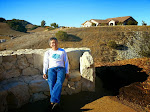I recently served on
a panel reading NSF grant proposals. We
were admonished not only to respect the confidentiality of the proposal
contents but also not to divulge the dates we did the reviews nor the title or
nature of the grant types being solicited.
I've reviewed NSF
grant proposals on about a half dozen occasions, and I've enjoyed each of my
experiences. There are typically 4 or 5
members to a committee, a few dozen committees representing the different STEM disciplines,
and each committee is assigned about a dozen proposals to review. NSF tries to create panels with a diversity
of geographical regions and of institution type
(research universities, state universities, liberal arts colleges, and
sometimes even two-year colleges). NSF brings in both faculty and
administrators.
Panelists register
online using the NSF program FastLane long before they see any of the
proposals. FastLane facilitates many aspects of the review process, such as
tracking panelist coordinates and other information for travel arrangements, giving access to
proposals, recording panelist reviews, and arranging letters to home institutions acknowledging
service.
Panelists upload to Fastlane their personal evaluations of each proposal before going to DC and
physically meeting as a panel. Project
descriptions are restricted to 15 pages, but with all the additional
documentation of references, biographical sketches, budget, etc., the entire
proposal usually exceeds 50 pages. So it
is also common that when the panels finally meet in DC on the first morning,
not all the panelists have successfully prepared reviews of all the proposals.
The panels meet
essentially all of the first day discussing each proposal. Panelists are logged on the FastLane program
during discussion. This allows each
panelist the ability to see the reviews of all the panelists for each proposal.
NSF assigns each
panelist to be "scribe" for two or three proposals, and the scribe's
task is to record the discussion about the proposal. NSF does not require consensus, but it is
common that the discussions persuade some panelists to change their initial
evaluations. Most panelists work into
the night preparing the summaries required by their duties as scribe and
resubmitting their personal proposal reviews.
The second morning
is spent largely in approving the scribe summaries. Again the panelists are logged on FastLane,
and they are not allowed to leave until each summary has been approved. NSF reconvenes the panels by discipline late
in the morning for a debriefing before sending the panelists back home.
The debriefing is
one of the highlights of the whole experience, because each panel typically
describes its two favorite proposals. So
we hear the highlights, and it's exciting to learn of innovative ideas that are
being pursued.


No comments:
Post a Comment